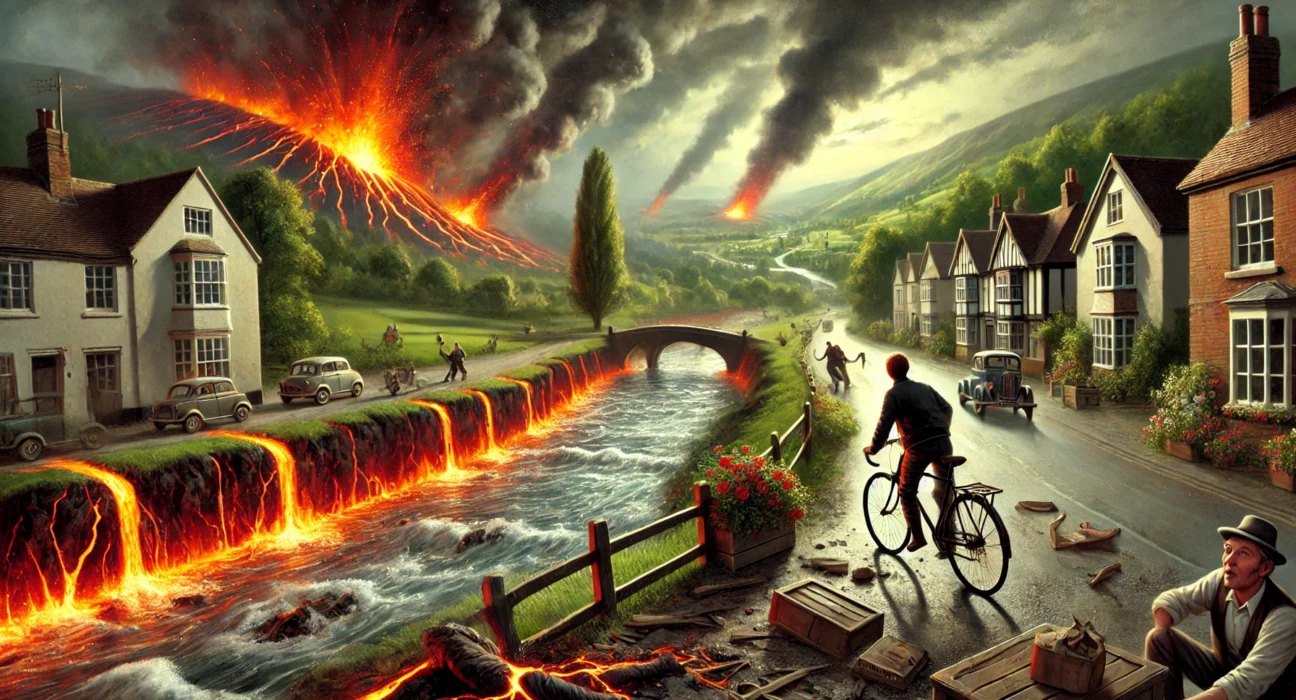The Thames Valley Catastrophe, a short work by Grant Allen, delves into the sudden eruption of a volcanic fissure in England’s Thames Valley, ultimately causing the destruction of London. Published in 1897, this early work of speculative fiction is notable for its first-person narrative, which captures the protagonist’s chaotic escape and the seismic devastation of a serene, civilized landscape. The story is both a dramatic personal account and a larger social critique of British complacency in the face of nature’s unpredictable power.
Plot Summary
On a clear August morning, the tranquility of the Thames Valley is shattered by an unimaginable disaster. The events unfold against the familiar landscapes of London and its serene surrounding towns. Amidst a picturesque English countryside, a devastating geological event rips open the earth and turns the calm river valley into a fiery inferno.
In the pleasant village of Cookham, a government official has come to spend his holiday, seeking a break from his duties in London. That evening, he encounters George W. Ward, a geologist from America who shares tales of monumental natural phenomena in the Western United States. Ward speaks of fissure eruptions, natural disasters so enormous that lava pours not just from a central volcano, but from a crack in the earth stretching miles. The Englishman listens with skepticism; the peaceful, cultivated English countryside, with its green fields and winding rivers, seems an unlikely stage for such devastation. Ward’s descriptions remain lodged in his mind, dismissed, however, as something confined to distant lands.
The following morning, a faint sound, distant and unfamiliar, hums through the air. It’s barely noticeable at first, but something is amiss. Looking across the river from Cookham Bridge, the official hears an agonized cry—a man on the tow-path running in terror, screaming with wild, incomprehensible fear. As the witness tries to make sense of the scene, a wave of blistering heat radiates from behind him, and he glimpses a wall of molten fire advancing over the peaceful valley. The reality crashes down upon him; the very fissure eruption Ward described is unfolding here in England, consuming the valley with a voracious heat.
The fire sweeps forward, overtaking the river and all along its banks, moving faster than anyone can outrun. The man realizes his only hope is to escape upward. He scrambles onto his bicycle, the searing heat already pressing upon him, and pedals toward the higher ground at Hedsor. As he ascends, he looks back to see the fire engulfing the river, the bridges, and any trace of life in its path. Only minutes ago, he had been lost in thoughts of a leisurely day, but now all notions of peace are burned away in the frantic need to survive. He watches in horror as Ward, caught in his own bicycle’s pedals, is overwhelmed by the advancing flames.
Pushing further up the hillside, the witness surveys the destruction sweeping through the valley. White-hot lava continues to pour from an unseen source up the river, cascading into the Thames and flooding outward. Majestic countryside views are blotted out by columns of smoke and clouds of ash. The fire flows through every crevice and fills each village along the way, mercilessly swallowing homes, trees, and fields. Suddenly, the enormity of the event overtakes him: this is no isolated disaster but an unprecedented geological event that will decimate not only Cookham, but any place along the Thames’s course—including London itself. His thoughts shift from survival to urgency; he must warn his family, who are entirely unaware of the danger barreling toward them.
Fueled by fear for his wife and young children back in London, he begins the desperate journey home, navigating backroads and lanes, relying on instinct and endurance. But the further he goes, the more he witnesses the calamity extending its deadly grip across the Thames Valley. By the time he reaches Burnham, the river of lava has reached the flatlands surrounding the town, and panic starts to spread. The people, previously dismissive, now stand dumbstruck as the fire’s approach becomes visible.
As he moves through towns and villages, he attempts to alert others, urging them to escape to the hills. Yet his warnings are met with disbelief. The unimaginable scope of the catastrophe is lost on those who cannot see it firsthand; to them, tales of a “fissure eruption” remain a fantastic impossibility. They laugh at his warnings, resuming their routines as he frantically pedals onward, feeling as though he is racing against the apocalypse itself.
Realizing that time is slipping away, he avoids main roads, opting instead for quiet paths to make up for lost ground. Approaching Uxbridge, he sees a fresh wave of lava surging faster than ever, overtaking people and buildings in its destructive path. As it overtakes the roads, fleeing animals and pedestrians are consumed by the burning flood, reduced to ash before the fire even reaches them. He has to turn aside once again, losing precious time in his route to London. His thoughts become single-minded, fixed on reaching his family before it’s too late.
Eventually, the smoke darkens the sky over London. For the first time, the city’s residents are alerted to a serious threat. Yet disbelief turns to horror as they finally recognize the source of the thickening clouds. The fire approaches Kensington and Paddington, and the air itself grows nearly unbreathable. At last, he reaches the edge of London, only to realize he cannot enter; the roads have become choked with frightened crowds and the smothering heat forces him back. Despair engulfs him—his family may already be lost to the unstoppable advance of the fire.
Suddenly, he remembers that his father’s birthday might have brought his wife and children to Hampstead, possibly sparing them from the burning path. Holding onto this sliver of hope, he heads toward the hill where his father resides, navigating through roads crowded with desperate, fleeing people. He urges his exhausted body onward, even as his vision fades from dehydration and weariness. At the familiar garden gate, he halts, too fearful to open it, his dread nearly paralyzing him.
Inside, the soft voices of his children meet his ears, and, with a surge of relief, he stumbles through the door. His wife and children are safe; they had come to visit his father, sparing them from the devastation that now envelops much of London. With no time to spare, he hurries them into a waiting carriage, paying the driver to take them as far as possible from the city. That night, they find shelter in a farmhouse far from the fire, watching as Hampstead itself glows orange against the sky from the reflection of the inferno that was once London.
The next morning, the world awakens to the enormity of the disaster. London has been utterly destroyed, replaced by a solid, black landscape of basalt. The enormity of the loss leaves a lasting imprint on all survivors, and while many turn to mourning, some react with strange indifference, unable to process such vast tragedy. The once-bustling metropolis, known for its resilience and enduring spirit, has vanished, leaving behind only the memories of a world engulfed by the power of nature in a single day.
Main Characters
- The Narrator: A government clerk in London, he becomes the first-hand witness to the eruption’s devastation, driven by both fear and determination to survive. His desire to save his family from impending disaster frames much of the narrative’s urgency.
- George W. Ward: An American geologist and cyclist whom the narrator meets shortly before the eruption. Ward’s knowledge of geological phenomena foreshadows the disaster and adds a scientific perspective to the catastrophe’s scale and implications.
- Ethel: The narrator’s wife, whom he is determined to rescue from London. Though she is not physically present for most of the story, Ethel represents the narrator’s anchor to a life of stability that is suddenly shattered by the eruption.
- The Children: Symbolizing innocence and the narrator’s hope for the future, his children motivate his intense drive to overcome obstacles and reach safety.
Theme
- Nature’s Unpredictable Power: The story underscores the terrifying unpredictability of natural forces. The eruption, which is a fissure event rather than a typical volcanic eruption, highlights humanity’s helplessness in the face of large-scale geological events.
- Complacency and Overconfidence: Many characters, including the narrator at first, believe that disasters of this magnitude cannot affect England. This attitude of invincibility is critiqued through the complacency that prevents people from responding until it is too late.
- Survival and Self-Preservation: The protagonist’s journey becomes a battle for survival, emphasizing the lengths one will go to save loved ones. His frantic journey through the countryside shows the tension between personal survival and the broader social catastrophe.
- Urban vs. Natural Landscapes: London’s sudden obliteration by natural forces serves as a commentary on human hubris in building civilizations while ignoring underlying geological risks, highlighting the fragility of urban spaces.
Writing Style and Tone
Allen’s writing in The Thames Valley Catastrophe blends Victorian precision with elements of speculative horror. His language is detailed and reflective, capturing both the beauty of England’s landscapes and the ensuing terror as they are destroyed. The first-person perspective allows the reader to experience the immediacy of the protagonist’s fear and urgency, as well as his internal conflict and sense of responsibility. Through his descriptive narrative, Allen creates vivid mental images of scenes like the Thames Valley ablaze and the people of London racing against inevitable doom.
The tone balances the protagonist’s personal emotions with a critical, almost foreboding, commentary on humanity’s lack of foresight. Allen uses the narrator’s intimate reflections to emphasize the story’s themes while allowing the horror to unfold naturally, creating suspense and a growing sense of dread. His style mirrors the formal yet dire tone typical of Victorian-era disaster stories, employing a sense of decorum even in moments of sheer panic, which amplifies the horror by juxtaposing the narrator’s composure against the devastation.
We hope this summary has sparked your interest and would appreciate you following Celsius 233 on social media:
There’s a treasure trove of other fascinating book summaries waiting for you. Check out our collection of stories that inspire, thrill, and provoke thought, just like this one by checking out the Book Shelf or the Library
Remember, while our summaries capture the essence, they can never replace the full experience of reading the book. If this summary intrigued you, consider diving into the complete story – buy the book and immerse yourself in the author’s original work.
If you want to request a book summary, click here.
When Saurabh is not working/watching football/reading books/traveling, you can reach him via Twitter/X, LinkedIn, or Threads
Restart reading!








